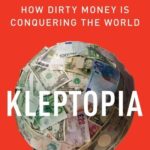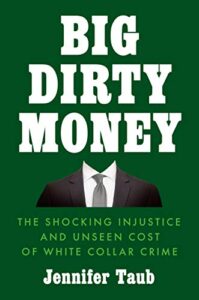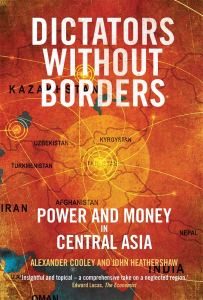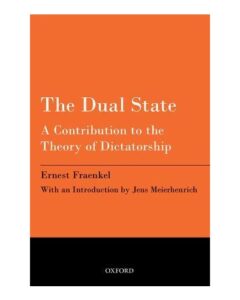Tom Burgis’s new book, “Kleptopia: How Dirty Money Is Conquering the World,” provides a magisterial account of the money and violence behind the world’s most powerful dictatorships, says a professor of law at Western New England School of Law and author of “Big Dirty Money: The Shocking Injustice and Unseen Cost of White Collar Crime,” to be released Sept. 29.
 Beyond documenting in great detail corruption across several continents, “Kleptopia” offers a theoretical frame, she writes for The Washington Post:
Beyond documenting in great detail corruption across several continents, “Kleptopia” offers a theoretical frame, she writes for The Washington Post:
“Globalization meant that rule by theft and the rule of law were co-existing,” Burgis writes. “Such tension could not be maintained indefinitely. One system would have to dominate, leaving the other as a façade.” This problem did not arise only after the fall of the Soviet Union and Russia’s nominal transformation to a market economy. We have seen this before. Burgis draws on the work of German legal scholar Ernst Fraenkel, who published “The Dual State: A Contribution to the Theory of Dictatorship” in 1941.
 “Fraenkel found what he believed to be ‘a key to understanding the National Socialist system of rule,’ ” Burgis writes. “It was the ‘concurrent existence of a “normative state” that generally respects its own laws, and a “prerogative state” that violates the very same laws.’ ”
“Fraenkel found what he believed to be ‘a key to understanding the National Socialist system of rule,’ ” Burgis writes. “It was the ‘concurrent existence of a “normative state” that generally respects its own laws, and a “prerogative state” that violates the very same laws.’ ”
Kleptopia follows the dirty money that is flooding the global economy, emboldening dictators and poisoning democracies, reports add:
They are everywhere, the thieves and their people. Masters of secrecy. Until now we have detected their presence only by what they leave behind. A body in a burned-out Audi. Workers riddled with bullets in the Kazakh desert. A rigged election in Zimbabwe. A British banker silenced and humiliated for trying to expose the truth about the City of London. They have amassed more money than most countries. But what they are really stealing is power.
 While it is early to assess the effect COVID-19 and the global response may have on transnational kleptocracy’s non-state networks, we may make some comments in three areas, adds John Heathershaw, co-author with Journal of Democracy contributor Alex Cooley of Dictators Without Borders and principal investigator of the Anti-Corruption Evidence project on the transnational ties of kleptocracies. There is reason to believe that demand for transnational connections will increase, he tells the National Endowment for Democracy’s International Forum:
While it is early to assess the effect COVID-19 and the global response may have on transnational kleptocracy’s non-state networks, we may make some comments in three areas, adds John Heathershaw, co-author with Journal of Democracy contributor Alex Cooley of Dictators Without Borders and principal investigator of the Anti-Corruption Evidence project on the transnational ties of kleptocracies. There is reason to believe that demand for transnational connections will increase, he tells the National Endowment for Democracy’s International Forum:
- While the response to the pandemic is characterized by extraordinary extensions of state power in many places, this is likely to be followed by instability caused by economic duress and grievances about ineffective state responses. Faced by such challenges, elites are all the more likely to prize their offshore bank accounts, second citizenships and residencies, and their global reputations. These provide an insurance policy against disaster at home and a means of flight for them and their families if they are pushed from power….
 On the supply-side, those intermediaries (or enablers) that preside over such transactions will find that their business is hardly affected by the global shutdown. These professionals—lawyers, accountants, agents—will rarely see a client directly. If they meet anyone, it would be a representative but, in most cases, transactions are completed remotely often with few or any of the appropriate “know your customer” and beneficial ownership checks.
On the supply-side, those intermediaries (or enablers) that preside over such transactions will find that their business is hardly affected by the global shutdown. These professionals—lawyers, accountants, agents—will rarely see a client directly. If they meet anyone, it would be a representative but, in most cases, transactions are completed remotely often with few or any of the appropriate “know your customer” and beneficial ownership checks.- Finally, effective global and national governance—vital to tackle transnational kleptocracy—appears to be under duress to a degree rarely seen in peacetime. In the UK, measures for public registries and initiatives to expose “authoritarian influencing” that survived Brexit may be delayed or watered down in the period of post-crisis recovery. In the US, much depends on whether important tools such as the Magnitsky sanctions become general instruments of policy rather than ad hoc measures.
In June 2019, the Senate Judiciary Committee held a hearing on “Combating Kleptocracy: Beneficial Ownership, Money Laundering, and Other Reforms,” Taub adds. Sen. Sheldon Whitehouse (D-R.I.) laid out the problem starkly: “America too often enables global corruption” by providing leaders who loot their countries “the shelter of our rule of law for their ill-gotten gains.”







